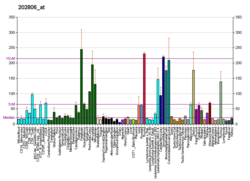Drebrin is a protein that in humans is encoded by the DBN1 gene.
The protein encoded by this gene is a cytoplasmic actin-binding protein thought to play a role in the process of neuronal growth. It is a member of the drebrin family of proteins that are developmentally regulated in the brain. A decrease in the amount of this protein in the brain has been implicated as a possible contributing factor in the pathogenesis of memory disturbance in Alzheimer's disease. At least two alternative splice variants encoding different protein isoforms have been described for this gene.
References
- ^ GRCh38: Ensembl release 89: ENSG00000113758 – Ensembl, May 2017
- ^ GRCm38: Ensembl release 89: ENSMUSG00000034675 – Ensembl, May 2017
- "Human PubMed Reference:". National Center for Biotechnology Information, U.S. National Library of Medicine.
- "Mouse PubMed Reference:". National Center for Biotechnology Information, U.S. National Library of Medicine.
- Toda M, Shirao T, Minoshima S, Shimizu N, Toya S, Uyemura K (Nov 1993). "Molecular cloning of cDNA encoding human drebrin E and chromosomal mapping of its gene". Biochem Biophys Res Commun. 196 (1): 468–72. doi:10.1006/bbrc.1993.2273. PMID 8216329.
- ^ "Entrez Gene: DBN1 drebrin 1".
Further reading
- Shirao T (1995). "The roles of microfilament-associated proteins, drebrins, in brain morphogenesis: a review". J. Biochem. 117 (2): 231–6. doi:10.1093/jb/117.2.231. PMID 7608104.
- Maruyama K, Sugano S (1994). "Oligo-capping: a simple method to replace the cap structure of eukaryotic mRNAs with oligoribonucleotides". Gene. 138 (1–2): 171–4. doi:10.1016/0378-1119(94)90802-8. PMID 8125298.
- Harigaya Y, Shoji M, Shirao T, Hirai S (1996). "Disappearance of actin-binding protein, drebrin, from hippocampal synapses in Alzheimer's disease". J. Neurosci. Res. 43 (1): 87–92. doi:10.1002/jnr.490430111. PMID 8838578. S2CID 40336358.
- Suzuki Y, Yoshitomo-Nakagawa K, Maruyama K, et al. (1997). "Construction and characterization of a full length-enriched and a 5'-end-enriched cDNA library". Gene. 200 (1–2): 149–56. doi:10.1016/S0378-1119(97)00411-3. PMID 9373149.
- Mammoto A, Sasaki T, Asakura T, et al. (1998). "Interactions of drebrin and gephyrin with profilin". Biochem. Biophys. Res. Commun. 243 (1): 86–9. doi:10.1006/bbrc.1997.8068. PMID 9473484.
- Hayashi K, Ishikawa R, Kawai-Hirai R, et al. (2000). "Domain analysis of the actin-binding and actin-remodeling activities of drebrin". Exp. Cell Res. 253 (2): 673–80. doi:10.1006/excr.1999.4663. PMID 10585290.
- Peitsch WK, Grund C, Kuhn C, et al. (2000). "Drebrin is a widespread actin-associating protein enriched at junctional plaques, defining a specific microfilament anchorage system in polar epithelial cells". Eur. J. Cell Biol. 78 (11): 767–78. doi:10.1016/s0171-9335(99)80027-2. PMID 10604653.
- Hartley JL, Temple GF, Brasch MA (2001). "DNA Cloning Using In Vitro Site-Specific Recombination". Genome Res. 10 (11): 1788–95. doi:10.1101/gr.143000. PMC 310948. PMID 11076863.
- Wiemann S, Weil B, Wellenreuther R, et al. (2001). "Toward a Catalog of Human Genes and Proteins: Sequencing and Analysis of 500 Novel Complete Protein Coding Human cDNAs". Genome Res. 11 (3): 422–35. doi:10.1101/gr.GR1547R. PMC 311072. PMID 11230166.
- Simpson JC, Wellenreuther R, Poustka A, et al. (2001). "Systematic subcellular localization of novel proteins identified by large-scale cDNA sequencing". EMBO Rep. 1 (3): 287–92. doi:10.1093/embo-reports/kvd058. PMC 1083732. PMID 11256614.
- Kobayashi S, Shirao T, Sasaki T (2001). "Drebrin expression is increased in spinal motoneurons of rats after axotomy". Neurosci. Lett. 311 (3): 165–8. doi:10.1016/S0304-3940(01)02155-3. PMID 11578820. S2CID 15935730.
- Shim KS, Lubec G (2002). "Drebrin, a dendritic spine protein, is manifold decreased in brains of patients with Alzheimer's disease and Down syndrome". Neurosci. Lett. 324 (3): 209–12. doi:10.1016/S0304-3940(02)00210-0. PMID 12009525. S2CID 20834151.
- Strausberg RL, Feingold EA, Grouse LH, et al. (2003). "Generation and initial analysis of more than 15,000 full-length human and mouse cDNA sequences". Proc. Natl. Acad. Sci. U.S.A. 99 (26): 16899–903. Bibcode:2002PNAS...9916899M. doi:10.1073/pnas.242603899. PMC 139241. PMID 12477932.
- Gevaert K, Goethals M, Martens L, et al. (2004). "Exploring proteomes and analyzing protein processing by mass spectrometric identification of sorted N-terminal peptides". Nat. Biotechnol. 21 (5): 566–9. doi:10.1038/nbt810. PMID 12665801. S2CID 23783563.
- Shiraishi Y, Mizutani A, Mikoshiba K, Furuichi T (2003). "Coincidence in dendritic clustering and synaptic targeting of homer proteins and NMDA receptor complex proteins NR2B and PSD95 during development of cultured hippocampal neurons". Mol. Cell. Neurosci. 22 (2): 188–201. doi:10.1016/S1044-7431(03)00037-X. PMID 12676529. S2CID 38323844.
- Peitsch WK, Hofmann I, Endlich N, et al. (2003). "Cell biological and biochemical characterization of drebrin complexes in mesangial cells and podocytes of renal glomeruli". J. Am. Soc. Nephrol. 14 (6): 1452–63. doi:10.1097/01.ASN.0000069222.63700.DE. PMID 12761245.
- Salazar MA, Kwiatkowski AV, Pellegrini L, et al. (2004). "Tuba, a novel protein containing bin/amphiphysin/Rvs and Dbl homology domains, links dynamin to regulation of the actin cytoskeleton". J. Biol. Chem. 278 (49): 49031–43. doi:10.1074/jbc.M308104200. PMID 14506234.
- Ota T, Suzuki Y, Nishikawa T, et al. (2004). "Complete sequencing and characterization of 21,243 full-length human cDNAs". Nat. Genet. 36 (1): 40–5. doi:10.1038/ng1285. PMID 14702039.





